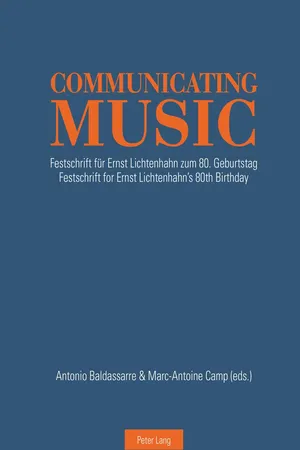
- 540 pages
- English
- PDF
- Only available on web
About This Book
Ernst Lichtenhahn ist ohne Übertreibung ein Doyen der schweizerischen Musikforschung. Als einer der wenigen Musikwissenschaftler im deutschsprachigen Raum hat er unterschiedliche sprachkulturelle und disziplinäre Forschungstraditionen zusammengeführt. In seinem Wissenschaftsverständnis sind historische und systematische Musikwissenschaft, Musikethnologie und Musikpraxis ganz im Sinne des von Guido Adler formulierten holistischen Konzepts sowohl methodisch wie auch inhaltlich immer eng aufeinander bezogen. Mit dem Titel «Communicating Music» versucht diese Festschrift zum 80. Geburtstag von Ernst Lichtenhahn, die durch dieses Verständnis hervortretende Vielschichtigkeit wissenschaftlicher Fragestellungen aufzugreifen und weiterzudenken. Sie versammelt Beiträge, die sich aus ganz unterschiedlichen methodischen und theoretischen Perspektiven mit Fragen nach dem diskursiven Charakter von Musik, den musikalischen Vermittlungs- und Transformationsprozessen sowie dem Sprechen über Musik an sich auseinandersetzen.
Without any exaggeration one can call Ernst Lichtenhahn a doyen of Swiss music research. As one of the few musicologists in the German-speaking sphere he has succeeded in merging different linguistic-cultural and disciplinary research traditions. In his manner of scientific understanding, historical and systematic musicology, ethnomusicology and music practice are methodologically and topically related closely to each other, entirely consistent with the holistic concept of music research as developed by Guido Adler. With the title «Communicating Music», this Festschrift for Ernst Lichtenhahn's 80 birthday attempts to take up and to further develop the diversity of scientific issues as emerged through such an understanding. It collects papers that come from a variety of methodological and theoretical perspectives to deal with issues about the discursive nature of music, about mediation and transformation processes of music as well as about the discourse on music itself.
Frequently asked questions
Information
Table of contents
- Cover
- Inhaltsverzeichnis
- Vorwort: Das Vermitteln reflektierten musikalischen Erlebens (Antonio Baldassarre und Marc-Antoine Camp)
- Introduction: Communicating reflected musical experience
- Für Ernst Lichtenhahn (Peter Wettstein)
- Musikalische Universalien: Über ein Problem, das nicht verschwindet, indem es veraltet (Christian Kaden)
- Argumentieren mit „Musik“: Farabi und Glarean. Fallbeispiele zum musikbezogenen Kommunizieren (Max Haas)
- Perfekte Symmetrie? –: Johann Sebastian Bachs Duett F-Dur BWV 803 (Karin Bernhard)
- Über Bagatellen übermässig reden – zu Ludwig van Beethovens op. 119 Nr. 8 (Daniel Muzzulini)
- „Auch ohne Worte kann sie Würkung thun“: Instrumentalmusik als Kommunikationsmittel in musikalischen Schriften des 18. und frühen 19. Jahrhunderts (Renate Lemmer Schönenberger)
- Still und fein – oder: Das sich=selbst=in=der=Historie=inszenierende Genie (Thomas Meyer)
- Musik und Performance Art: Improvisation innerhalb der Künste (Hermann Bühler)
- Wagner-Orchester und Proszenium: Herausforderung für den Theaterarchitekten Gottfried Semper (Dorothea Baumann)
- Venedig – Musik als Lebensstil (Ellen Taller)
- Stadt – Klang – Normalität: Auseinandersetzungen mit Klangräumen des Urbanen (Patrick Müller)
- Raumklang oder: Lässt sich Architektur als Musik begreifen?: Eine praxisbezogene Erörterung (Inès & Fabian Neuhaus)
- Remo Rau (1927–1987): Katalysator für die Emanzipation des Jazz in der Schweiz (Thomas Gartmann)
- Motörhead’s Ace of Spades: Ein Wendepunkt in der Musikgeschichte (Dieter Ringli)
- Quelques réflexions sur les aléas du terrain (François Borel)
- Au delà du musical: Les leçons du terrain (Laurent Aubert)
- Die Erstellung der Liste der lebendigen Traditionen in der Schweiz (Marc-Antoine Camp)
- „Mir ist das Ohr für die Musik verschlossen“: Zu Jeremias Gotthelfs Musikverständnis (Brigitte Bachmann-Geiser)
- Ernst Lichtenhahn’s Role in the Development of Macedonian Ethnomusicology in the 21st Century (Dimitrije Buzarovski)
- Musikpädagogik zwischen ästhetischer Teilhabe und sozialer Praxis (Jürg Huber)
- Volksoboen: Ihre emotionale Wirkung und soziale Bedeutung (Heinz Stefan Herzka)
- Musikalische Machtsymbole in der Maya-Nachklassik (Matthias Stöckli)
- „Nun ist die erste Pflicht erfüllt“: Der Sündenfall in Joseph Haydns Schöpfung – im Spannungsfeld von Musikwissenschaft und Interpretation (Dominik Sackmann)
- W. A. Mozarts Azione sacra La Betulia liberata KV 118 (74c): Zur Interpretation von Mozarts frühen dramatischen Werken (Alois Koch)
- „Frutto di una lunga e laboriosa fatica“: Betrachtungen über Mozarts Weg zur klassischen Durchführungstechnik (Akio Mayeda)
- „O altitudo!“ – Literarisches Motto und musikalischer Prozess in Franz Liszts „Bergsymphonie“: oder: Warum das Werk doppelt so lange dauert, wie manche möchten (Joseph Willimann)
- Verdi’s Gustavo III and the Critical Edition (Andreas Giger)
- Völkerkunde auf dem Theater: Die Baskische Venus von Hermann Hans Wetzler (1870–1943) (Heinrich Aerni)
- Negotiating History, Nation and the Canon: The String Quartets of Silvestre Revueltas (Antonio Baldassarre)
- Debussy interpretieren: Die Orchestrationen der Six Epigraphes antiques von Erich Schmid / Erich Itor Kahn und Ernest Ansermet im Vergleich (Lukas Näf)
- Gedanken und Erfahrungen zum Thema der nonverbalen Interaktion zwischen Dirigent und Orchester (Martin Lukas Meister)
- Autorinnen und Autoren / Authors
- Schriftenverzeichnis / Ernst Lichtenhah
- Tabula gratulatoria